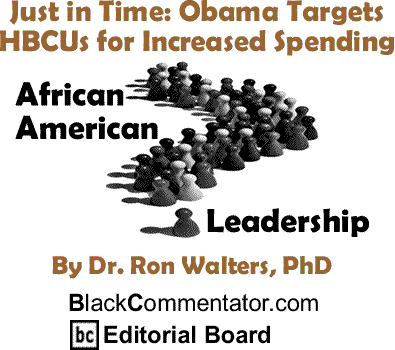
|
||||||||||||||||||||||
|
||||
 |
||||
As the proud graduate of an Historically Black University and having worked in one for most of my academic career, I approve of President Barack Obama having broken his pledge not to govern by race or ethnicity just in time to increase spending for HBCUs.� These institutions are still vitally relevant to the production of a black middle class because, while they only constitute 3% of all institutions of higher education, they graduate 20% of all black undergrads.� Announcing current increases in the FY 2012 Federal Budget was Dr. John S. Wilson, the new Executive Director of the White House Initiative on HBCUs, who said that the President�s budget includes a $17 billion increase in Pell Grants, $400 million of which was earmarked for HBCUs.�� Last year, there was an uproar when it was discovered that the President took $85 million from the HBCU budget, but this year, rather than mandating it for two years as the Bush administration had done, this sum is included in the President Obama�s budget for 10 years.�� There is also $98 million in new money proposed for HBCUs that would fund such things as financing for capital costs like the repair and replacement of educational facilities and equipment, and the building of physical infrastructure.� There is also a proposed $65.4 million for the enhancement of graduate programs. One of the greatest areas of lack of growth in the federal budget however, has been in the funds generated by the government which goes to research at institutions of higher education.� Some of it, in the areas of energy, defense, or agriculture, requires sophisticated engineering or scientific research facilities that most of these institutions do not have, but other grants in the social, administrative, and economic areas should be achievable. This funding increase is also welcome news in light of the current economic crisis that threatens to continue the laggard growth of the black middle class.� The unemployment and home foreclosure crises put at severe risk the kind of capital that has enabled black families to fund college enrollment in the previous generation and so many in this generation have a far more difficult time acquiring enrollment, remaining enrolled and potentially graduating.�� While some observers have been focused on academic performance as the major factor in black college retention rates, economic factors have always been as important.
The general increase in higher education funding will help those in non-HBCU institutions as well.� The other shoe to drop has been the fact that most black youths are in state supported institutions, either four-year institutions or community colleges, and state governments have chosen to cut education budgets deeply to balance their budgets.� This has caused a rise in the tuition rates, teacher furloughs and curriculum reductions at many institutions.� In most states, the education budget is the largest funded item and cuts in places such as California have recently drawn very visible protests from students and faculty.�� Federal funds given to states from the bank bailout (TARP) have disproportionately gone to support K-12, such that while the latter has suffered a 3% decrease in funding in California, higher education has suffered a 5% decrease. While states are grappling for solutions to the problem of overall education funding, I would suggest they should look at the amount of spending involved in holding non-violent offenders in prisons.�� Some states are now beginning to look at alternatives to incarceration more seriously than when they were just theoretical possibilities and some are actually letting prisoners go.����
Meanwhile, Mr. President, thanks for the help for HBCUs in this crisis. BlackCommentator.com Editorial Board member, Dr. Ron Walters,PhD is a Political Analyst, Author and Professor Emeritus of the University of Maryland, College Park. His latest book is: The Price of Racial Reconciliation (The Politics of Race and Ethnicity) (University of Michigan Press). Click here to contact Dr. Walters. |
||||
 |
||||
If you would like to comment on this article, please do so below. There is a 400 character limit. You do not need a FaceBook account. Your comment will be posted here on BC instantly. Thanks. Entering your email address is not mandatory. You may also choose to enter only your first name and your location.
|
||||
Thank you very much for your readership. |
||||
| Any BlackCommentator.com article may be re-printed so long as it is re-printed in its entirety and full credit given to the author and www.BlackCommentator.com. If the re-print is on the Internet we additionally request a link back to the original piece on our Website. | ||||
| |
||||
March 11, 2010 |
| Executive Editor: David A. Love, JD |
| Managing Editor: Nancy Littlefield |
| Publisher: Peter Gamble |
| Est. April 5, 2002 |
| Printer Friendly Version in resizeable plain text format |
 |
 |
 |

|
 |
| |
| |












































